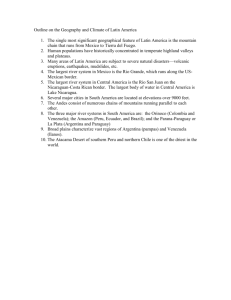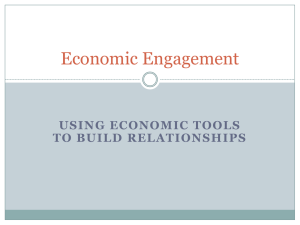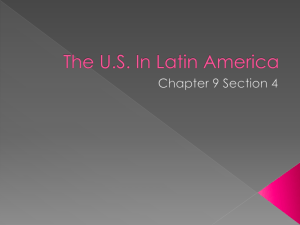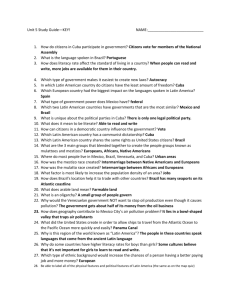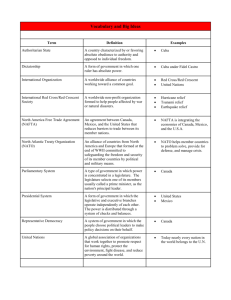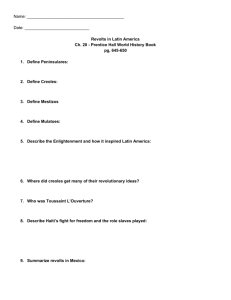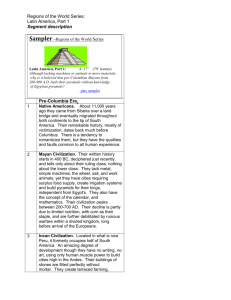Independence of Latin America & Latin American
advertisement
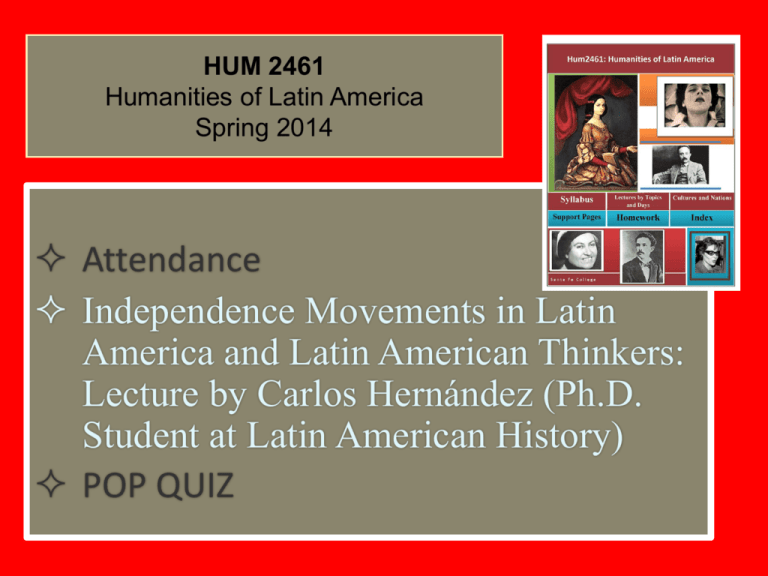
HUM 2461 Humanities of Latin America Spring 2014 Attendance Independence Movements in Latin America and Latin American Thinkers: Lecture by Carlos Hernández (Ph.D. Student at Latin American History) POP QUIZ Independence Movements in Latin America and Latin American Thinkers Carlos Hernández University of Florida Ph.D. Student in Latin American History Learning Objectives • • • • “Independence” as process(es) and concept “Latin America” as place and concept Transatlantic connections Relationship between race and nation – Role of intellectuals – Contestation from below • Legacies today What is independence? • Discussion: – What are some associations that come to mind? – Does independence mean freedom? Democracy? Constitutionalism? Civil rights? • Reflection: – How does your background affect the way you think about these questions? – Do these concepts have different meanings in different contexts? What is Latin America? • “Latin America” is a place and concept • The concept has a history • That history is related to colonization, independence, and beyond • Presentation will focus on Spanish America – Mexico, Gran Colombia, and Cuba Presentation’s Focus • Mexico, Gran Colombia, and Cuba • Gran Colombia – Roughly Colombia, Venezuela, Ecuador, and Panama, with parts of Peru, Guyana, and Brazil • Why these examples? – MX as the beginning: first viceroyalty created and one of the first to rebel – Bolivarian legacies in South America – Cuba as a latecomer and first major U.S. intervention • Transatlantic connections • Role of intellectuals in shaping race and nation – Concept of independence related to national identity Independence: From Empires to Nations • Before there were nations, there were empires • Discussion: – Are there differences between empires and nations? If so, what are they? • Reflection: – We might be tempted to think of the transition as neat and linear, but it was actually very messy Colonial Organization of Spanish America • Spain generally managed colonies through viceroyalties – Cuba one of the exceptions • Viceroys supposedly represented the king and theoretically reported to him • Established by late 18th C. • New Spain, Peru, New Granada, and Río de la Plata Why Independence? Transatlantic Connections • Relative colonial peace since mid-16th C. • Late 18th and early 19th centuries, “Age of Revolutions” • European wars=debt; led to new colonial policies – Bourbon reforms and “the Enlightenment”: new line of monarchs called for centralization, taxation, and secularization • U.S., French, and Haitian Revolutions • Iberian crisis: Napoleon invaded Spain in 1808; Mexico rebelled in 1810; others followed The Viceroyalty of New Spain Mexican Independence: Some Pivotal Moments • 1810: “Grito de Dolores” • 1813: Chilpancingo Congress – “Sentiments of the Nation” • 1821: Mexico gained Independence under the “Empire” of Agustín de Iturbide • 1824: Mexico became a constitutional federal republic The Viceroyalty of Peru and its Transformations Bolivarian Movements • Spanish crisis • “The Liberator” – Roughly Venezuela, Colombia, Panama, Ecuador, Peru, and Bolivia • Sought and accepted aid from Haiti • Venezuela: 3 republics – 1810-12; 1812-14; 1817-20 • Quito and Peru: 1821-24 • Ca. 1820-25: Pres. of Gran Colombia & Peru • 1825: Upper Peru/Charcas (Bolivia) • 1826-30: Internal divisions and collapse of Gran Colombia into successor states • 1830: Died of TB after his project failed • Vision was to create a united and centralized state – Legacy resonates with the LA left today What about Cuba? • Not a viceroyalty – Sugar colony • Latecomer to independence – Remained loyal due to economic reasons • Independence movements related to abolition of slavery Cuba’s Long Struggles for Independence • 1868, Grito de Yara • Ten Years’ War, 1868-78 • Little War, 1879-80 – Gradual abolition scheduled for 1888 – Full abolition in 1886 • Independence War, 1895-98 – “Spanish-American” War of ’98 • “Independent” by 1898 • U.S. Occupation, 1902-04 Spanish American Independence in a Comparative Context • What would become independence movements began with a desire for autonomy • Pro-independence view won because Spain became increasingly repressive – 1808 Napoleonic invasion – 1812 Cortes de Cádiz (liberal Span. Const.) – 1814 Restoration of Ferdinand VII=absolutism, revocation of 1812 Const.; rebels polarized Escribir historia, hacer patria: Inventing the Nation • Discussion: – What is a nation? • Age of revolutions also the age of history • Intellectuals “invented” the nation by writing about it • The processes of independence became collapsed into a single concept, “Independence” – This was laregly retrospective • Defining “independence” meant imagining “the nation” • The nation needed a national subject – Race and nationality became tied Race and Nation in Latin American Thought: Some Examples • José María Morelos y Pavón’s “Sentiments of the Nation” • Simón Bolívar’s “Letter from Jamaica” • José Martí’s “Our America” Morelos’s “Sentiments of the Nation” (Sept. 14, 1813) • Morelos’s vision of MX nation – “America” rather than “Mexico” • Listed 23 points: – “America is free and independent of Spain and of all other nations, governments, or monarchies.” – Catholicism; Sept. 12 (Day of the Virgin of Guadalupe) – Popular sovereignty, elimination of colonial privileges (laws applied equally to all) – Abolition of slavery and racial distinctions – Right to private property – End of “tribute” – Defense of national sovereignty – September 16th declared a national holiday; honored Hidalgo • Bolívar’s “Letter from Jamaica” (1815) Highlights: – “We are, moreover, neither Indian nor European, but a species midway between the legitimate proprieties of this country and the Spanish usurpers. In short, though Americans by birth we derive our rights from Europe, and we have to assert these rights against the rights of the natives, and at the same time we must defend ourselves against the invaders.” – “I desire to see America fashioned into the greatest nation in the world, greatest not so much by virtue of her area and wealth as by her freedom and glory…Although I seek perfection for the government of my country, I cannot persuade myself that the New World can, at the moment, be organized as a great republic.” – “I do not favor American monarchies…I think the Americans…would prefer republics to kingdoms.” – “Surely unity is what we need to complete our work of regeneration.” Martí’s “Our America” (1892) • “America” did/does not mean “U.S.” • Highlights: – “Whatever is left of that sleepy hometown in America must awaken.” – “In America, the good ruler does not need to know how the German or Frenchman is governed” – “Our own Greece is preferable to the Greece that is not ours…Statesmen who arise from the nation must replace statesmen who are alien to it.” – “There is no racial hatred because there are no races.” • Legacy in Cuba: Race became taboo to talk about; today it’s “counterrevolutionary” • Legacy outside Cuba: Pan-Americanism Independence: From Processes to Concept(s) • Combatants were generally peasants, indigenous, and, black, and of mixed races • Women rarely fought but contributed in significant ways – Cooked, took care of sick, etc. • Intellectuals imagined “the nation” in racial terms – Lang. of mestizaje became the new baroque • Creation of “heroes” vs. “villains” • Left lasting legacy of competing and conflicting visions of nationalism and politics Meanings of Independence Today • Bicentennial celebrations in 2010: Argentina, Chile, and Mexico – Mexico: 2010 also the Centennial of the Revolution • “Bolivarian Revolution”: Chávez’s call for “popular democracy” evoked Bolívar’s legacy • Florida: large immigrant populations from Latin America and the Caribbean Suggested Readings • Anderson, Benedict. Imagined Communities: Reflections on the Origin and Spread of Nationalism. (2006 revised edition) • Ferrer, Ada. Insurgent Cuba: Race, Nation and Revolution, 1868-1898. (1999) • Mignolo, Walter. The Idea of Latin America. (1991) • Rodríguez, Jaime. The Independence of Spanish America. (1998)
